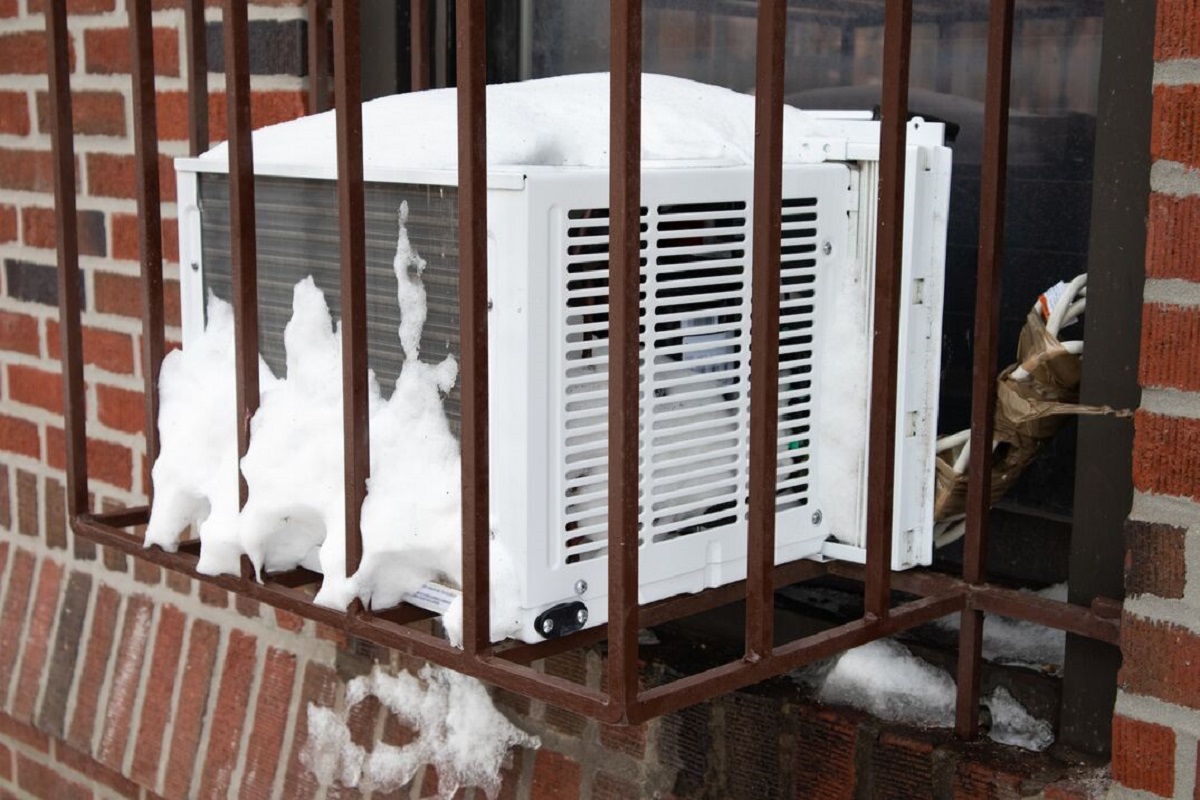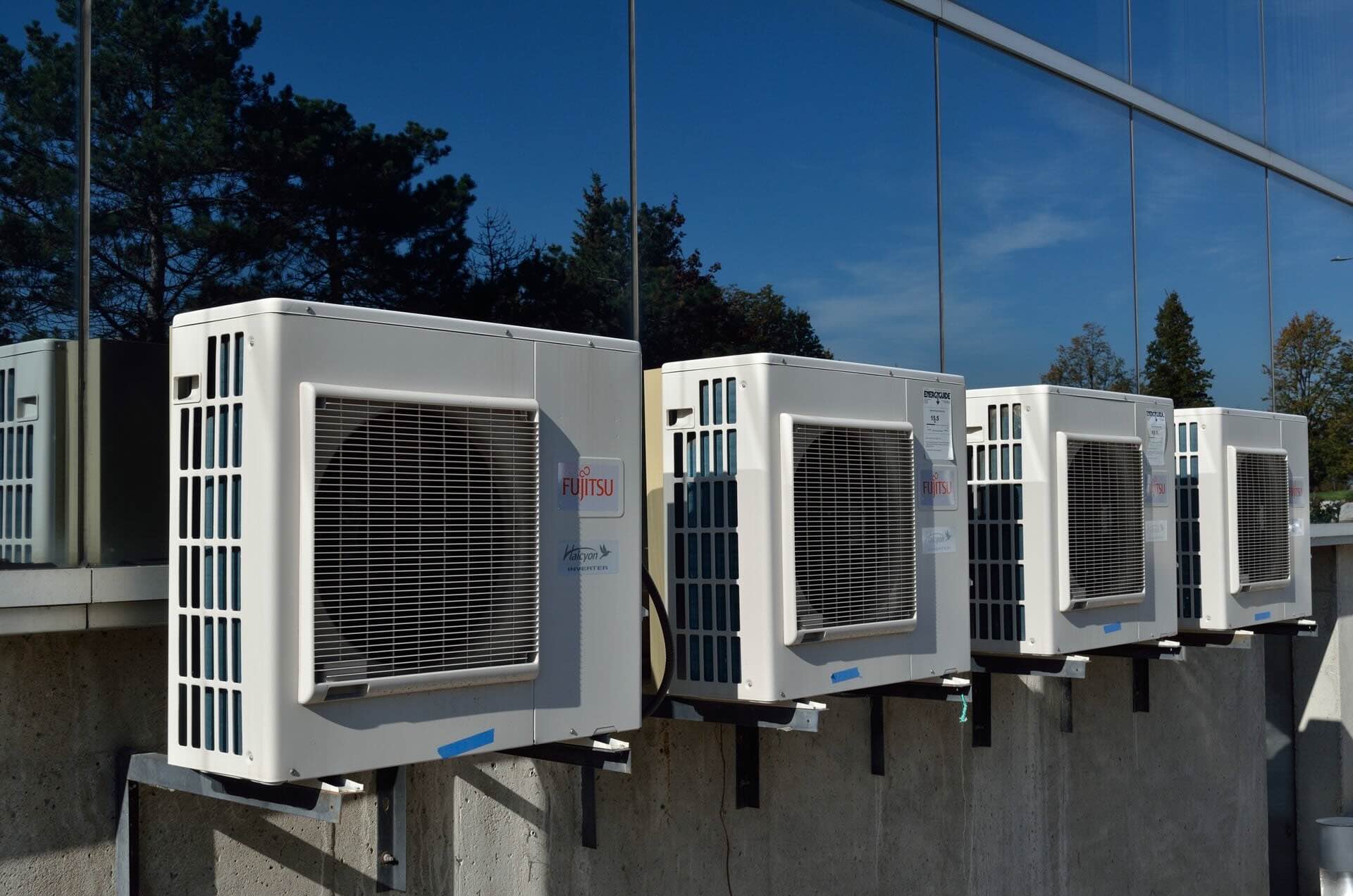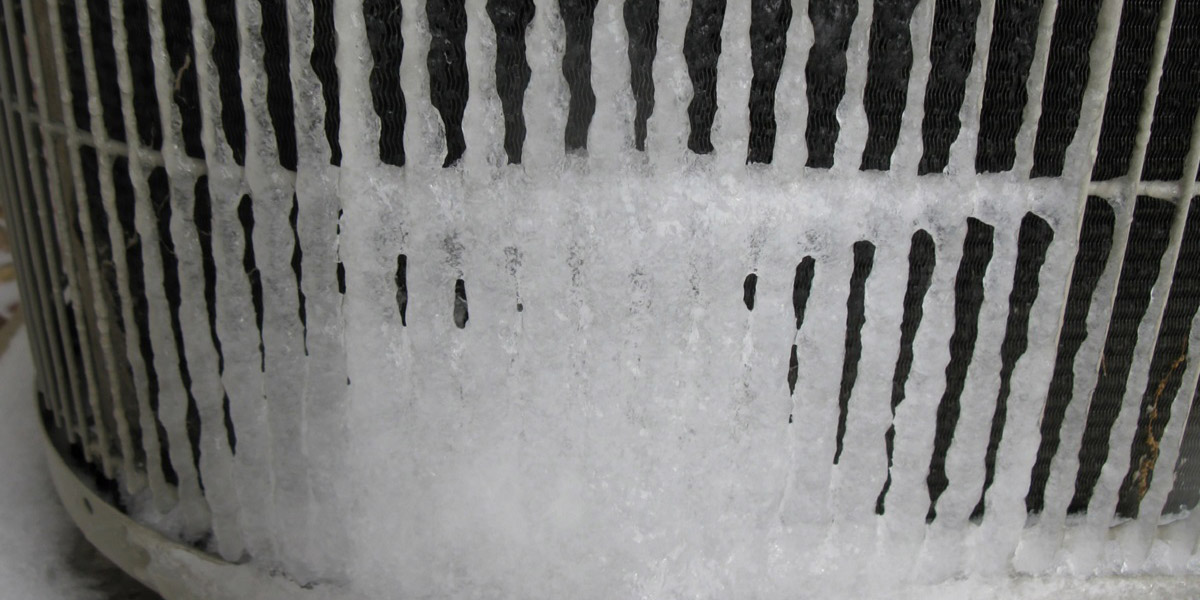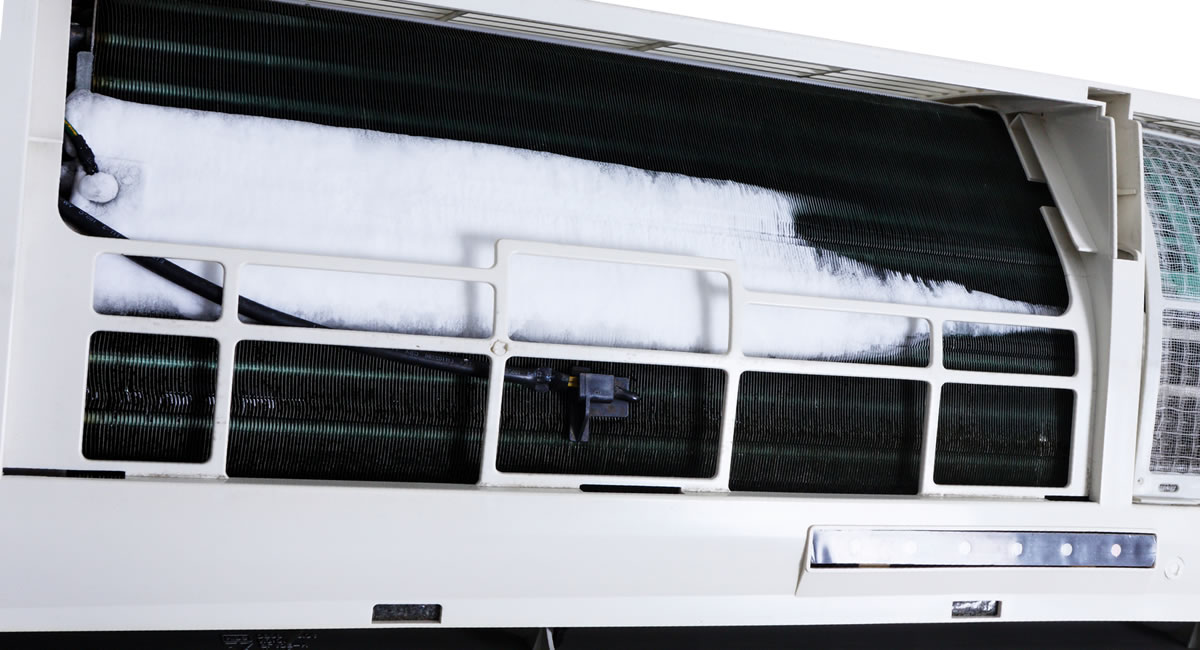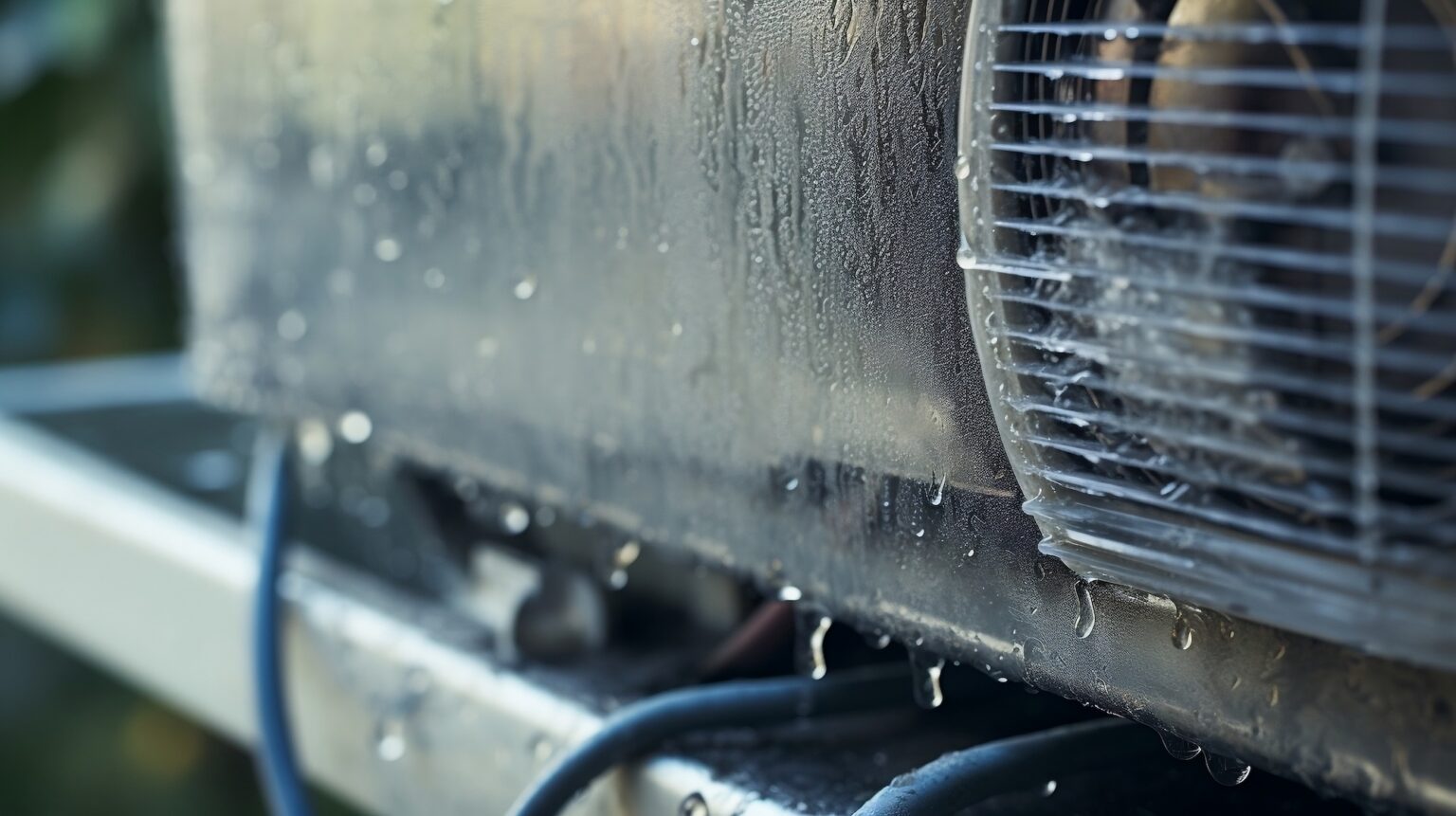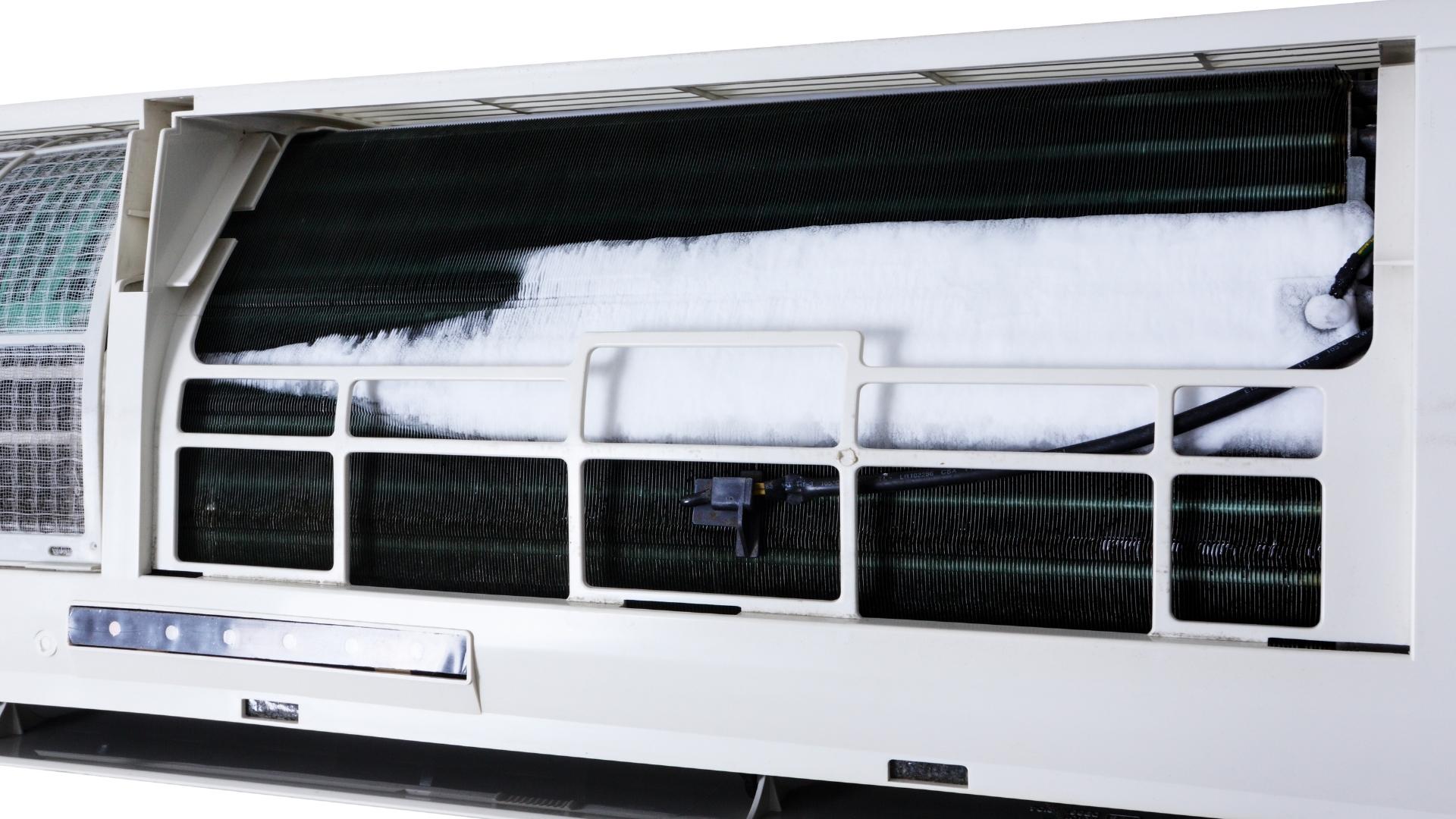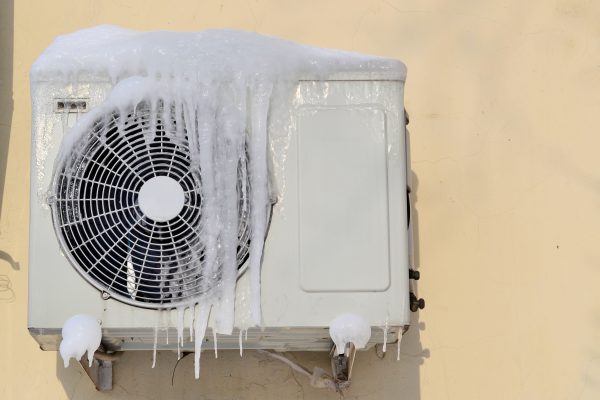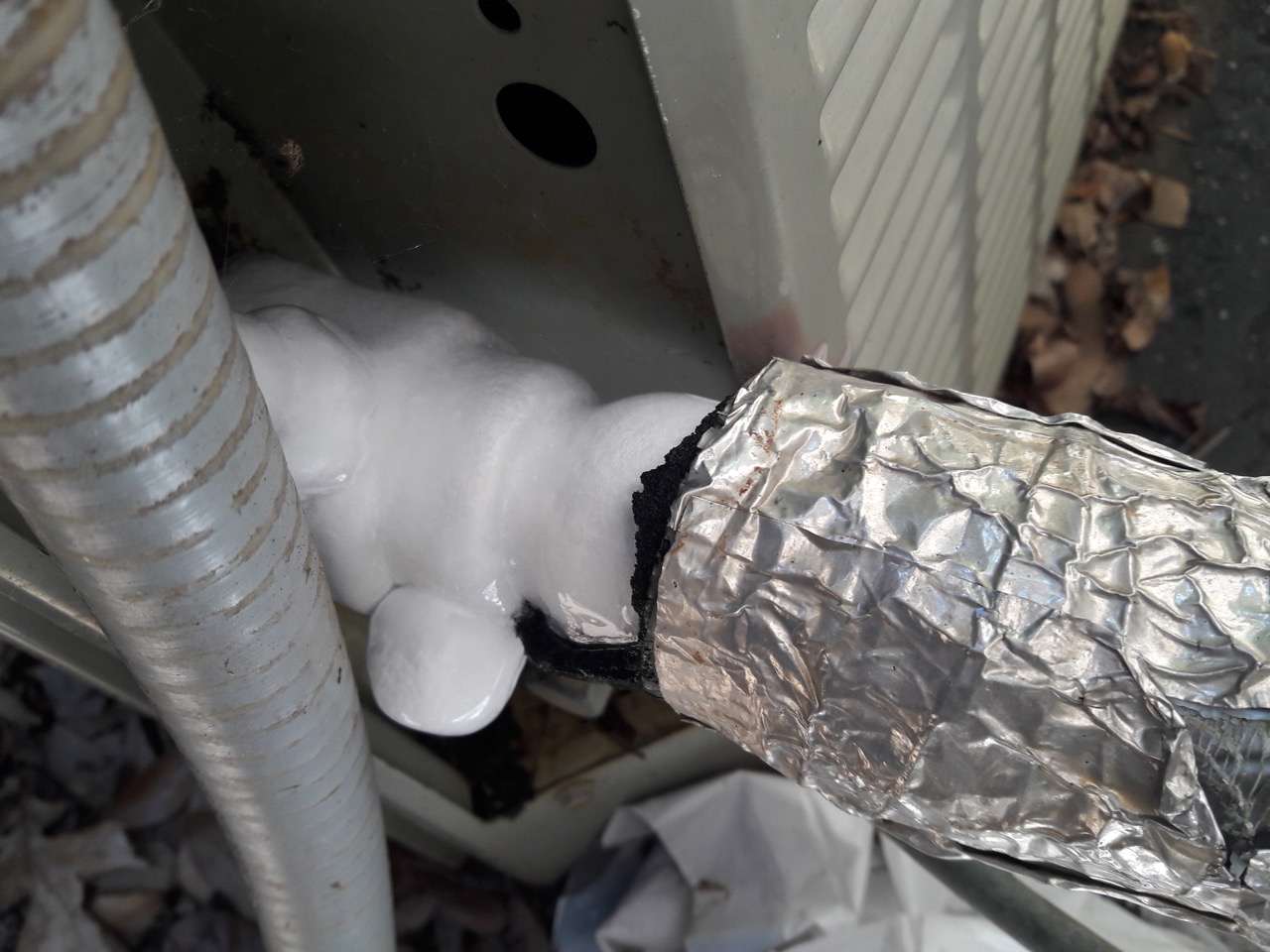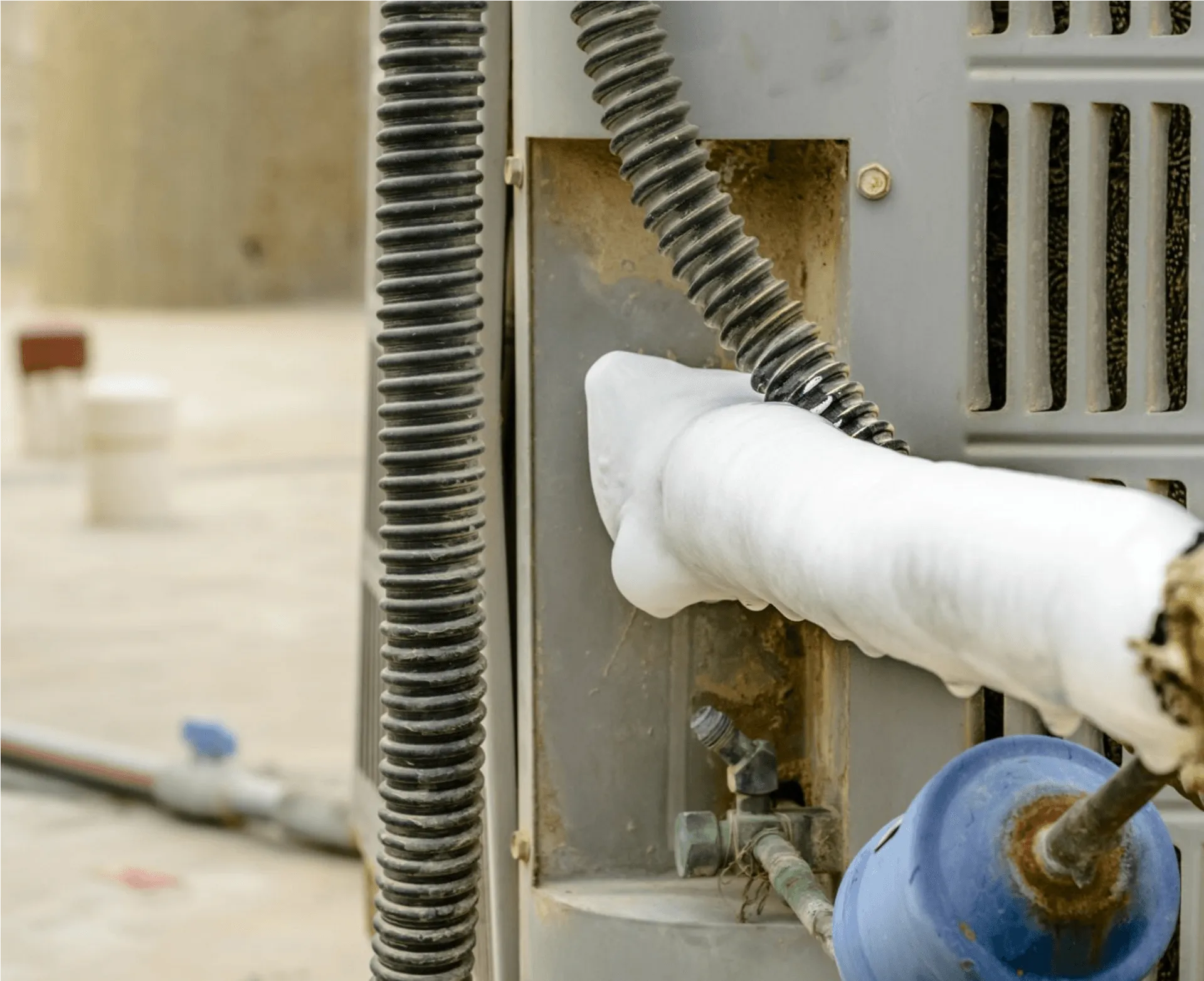Home>Home Maintenance>Why Is My Air Conditioner Lines Freezing Up
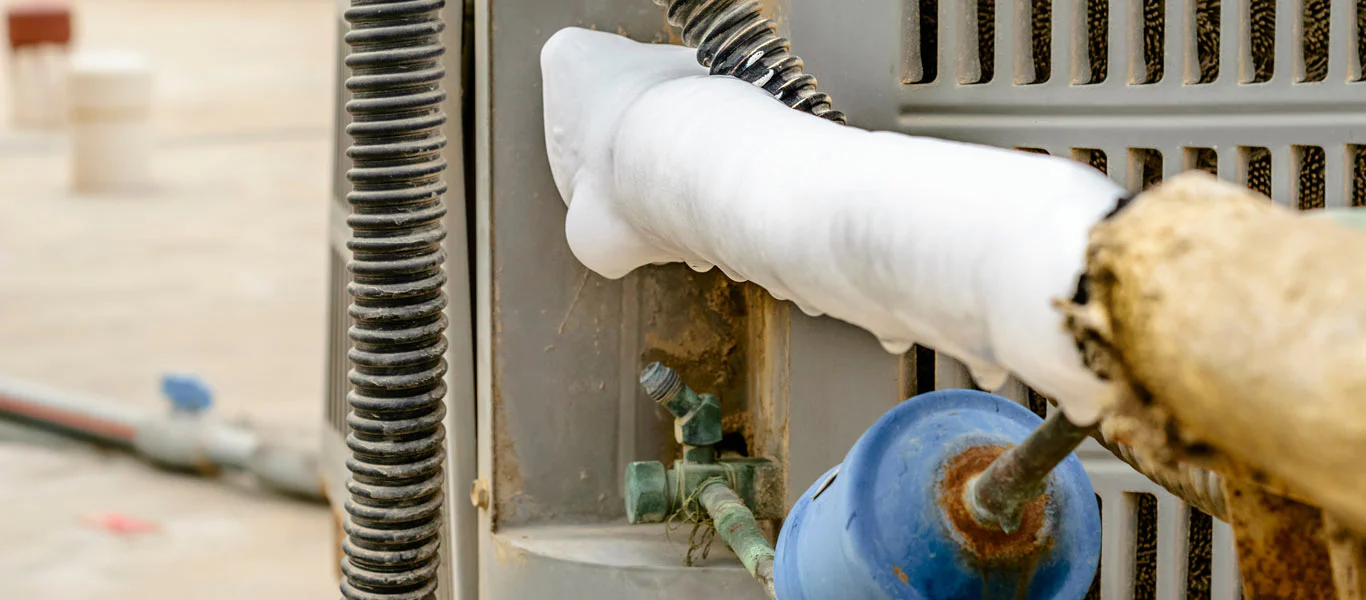

Home Maintenance
Why Is My Air Conditioner Lines Freezing Up
Modified: March 7, 2024
Discover the reasons behind your air conditioner lines freezing up and learn how to prevent it in this comprehensive home maintenance guide.
(Many of the links in this article redirect to a specific reviewed product. Your purchase of these products through affiliate links helps to generate commission for Storables.com, at no extra cost. Learn more)
Introduction
Welcome to our comprehensive guide on why air conditioner lines freeze up. If you’ve ever experienced the frustration of a frozen air conditioner, you know it can be a major inconvenience, especially during the hot summer months when you rely on your AC the most.
Understanding why your air conditioner lines freeze can help you diagnose the issue and potentially fix it before it becomes a bigger problem. In this article, we’ll explore some of the common causes of air conditioner lines freezing up and provide troubleshooting tips to help you resolve the issue.
Before diving into the causes and solutions, let’s first understand the basics of air conditioner freezing. Your air conditioner works by removing heat and humidity from your home, but sometimes this process can go awry, resulting in frozen air conditioner lines.
When the air flowing over the evaporator coil becomes too cold, it can cause the moisture in the air to freeze. This can lead to a buildup of ice on the evaporator coil, refrigerant lines, and other components of your air conditioning system.
A frozen air conditioner not only reduces the cooling efficiency of your system but can also cause damage to the compressor and other vital components if left unaddressed. That’s why it’s crucial to identify the underlying cause of the freezing and take appropriate action to resolve it.
Now that we have a basic understanding of air conditioner freezing, let’s explore some common causes in detail and learn how to troubleshoot and fix frozen air conditioner lines.
Key Takeaways:
- Regularly cleaning or replacing air filters, ensuring proper airflow, and addressing blower fan issues can prevent air conditioner lines from freezing and maintain efficient cooling.
- Professional HVAC technicians should handle refrigerant-related issues and inspect and repair problems with the evaporator coil and condensate drain line to prevent frozen air conditioner lines.
Read more: Why Is My RV Air Conditioner Freezing Up
Understanding the Basics of Air Conditioner Freezing
Before we delve into the common causes and troubleshooting of frozen air conditioner lines, it’s essential to grasp the fundamentals of why this issue occurs.
An air conditioner operates by circulating refrigerant through a closed-loop system. The refrigerant absorbs heat from the indoor air, cooling it down, and then releases the heat outside. The evaporator coil, located inside the indoor unit, plays a crucial role in this process.
When warm air from your home passes over the evaporator coil, the refrigerant inside the coil absorbs the heat. The now-cooled air is then circulated back into your home, while the heated refrigerant moves to the outdoor unit, where it releases the collected heat.
In ideal circumstances, the cooling process should continue uninterrupted. However, various factors can disrupt this process, leading to the formation of ice on the air conditioner lines. When the evaporator coil’s temperature drops below freezing, condensation in the air can freeze on its surface, eventually causing ice buildup.
Several factors contribute to the drop in temperature and subsequent freezing of the evaporator coil:
- Inadequate Airflow: Insufficient airflow over the evaporator coil can restrict the heat transfer process, allowing the coil to become too cold and freeze up.
- Low Refrigerant Levels: Inadequate refrigerant levels can result in an imbalance in the cooling process, causing the evaporator coil to become excessively cold.
- Dirty Air Filters: Dirty air filters reduce airflow, leading to restricted airflow over the evaporator coil and potential freezing.
- Issues with the Blower Fan: A malfunctioning blower fan can impede airflow, causing the evaporator coil to become too cold and freeze up.
- Problems with the Evaporator Coil: If the evaporator coil is damaged or dirty, it can hinder heat transfer and cause freezing.
- Damaged or Clogged Condensate Drain Line: A blocked or damaged condensate drain line can result in moisture buildup around the evaporator coil, eventually leading to freezing.
By understanding these underlying factors, you can now begin to diagnose and address the cause of the frozen air conditioner lines. In the following sections, we’ll explore each factor in more detail and provide solutions for troubleshooting and fixing the issue.
Common Causes of Air Conditioner Lines Freezing Up
When your air conditioner lines freeze up, it’s crucial to identify the root cause to prevent further damage and restore the cooling efficiency of your system. Here are some common culprits behind frozen air conditioner lines:
- Inadequate Airflow: Insufficient airflow over the evaporator coil is one of the primary causes of air conditioner lines freezing up. This can occur due to closed or blocked vents, dirty air filters, or malfunctioning blower fans. When airflow is restricted, the evaporator coil gets colder than it should, leading to the formation of ice.
- Low Refrigerant Levels: Refrigerant is essential for absorbing and releasing heat in the air conditioning process. If your system has a refrigerant leak or inadequate levels, the evaporator coil may not receive enough refrigerant to maintain the proper temperature. This can cause the coil to become excessively cold and freeze up.
- Dirty Air Filters: Air filters play a crucial role in trapping dust, pollen, and other particles from entering your air conditioning system. Over time, these filters can become clogged, reducing airflow over the evaporator coil. With limited airflow, the coil’s temperature drops, leading to ice formation.
- Issues with the Blower Fan: The blower fan in your air conditioning system is responsible for circulating the air throughout your home. If the fan is not functioning correctly, it can hinder the airflow over the evaporator coil. As a result, the coil can become excessively cold and freeze up.
- Problems with the Evaporator Coil: The evaporator coil is where heat exchange occurs in your air conditioning system. If the coil is damaged or dirty, it can impede heat transfer and cause the coil to become too cold, resulting in the formation of ice on the air conditioner lines.
- Damaged or Clogged Condensate Drain Line: The condensate drain line is responsible for removing the excess moisture that accumulates during the cooling process. If the drain line is damaged or clogged, water can back up and cause the evaporator coil to become wet. Subsequently, this moisture can freeze and lead to frozen air conditioner lines.
These common causes can vary in severity and require different troubleshooting approaches. In the following sections, we will explore each cause in more detail and provide guidance on how to troubleshoot and fix frozen air conditioner lines.
Inadequate Airflow as a Cause of Freezing Air Conditioner Lines
One of the main culprits behind air conditioner lines freezing up is inadequate airflow over the evaporator coil. When there is restricted airflow, the coil’s temperature drops below freezing point, causing condensation to freeze on its surface and leading to ice formation on the air conditioner lines. Here are some common factors that can contribute to inadequate airflow:
- Closed or Blocked Vents: Ensure that all vents in your home are open and unobstructed. Closed or blocked vents can restrict the airflow and prevent proper circulation throughout your home.
- Dirty Air Filters: Regularly clean or replace the air filters in your air conditioning system. Dirty filters can hinder airflow, forcing the system to work harder and potentially leading to freezing of the evaporator coil.
- Malfunctioning Blower Fan: The blower fan plays a vital role in circulating the air throughout your home. If the fan is not functioning properly, it can result in inadequate airflow over the evaporator coil. Check the fan for any issues and ensure it is operating at the correct speed.
- Ductwork Issues: Inspect your ductwork for any leaks, blockages, or disconnected sections. Damaged ducts can disrupt airflow, causing temperature imbalances and potentially leading to freezing of the evaporator coil.
If you suspect that inadequate airflow is causing your air conditioner lines to freeze up, here are some troubleshooting steps you can take:
- Check and Clean the Air Filters: Dirty air filters can significantly reduce airflow. Remove the filters and clean them using a vacuum or wash them in mild soapy water. Allow them to dry completely before reinstalling. If the filters are damaged or worn out, replace them with new ones.
- Clear Obstructions: Ensure that all vents and registers are open and unobstructed. Move any furniture or objects that may be blocking the airflow. This will help improve the circulation of air in your home.
- Inspect the Ductwork: Check your ductwork for any signs of leaks, blockages, or disconnected sections. Seal any leaks with duct tape or use mastic sealant for more significant gaps. Clear any debris or obstructions from the ducts and ensure that they are properly connected.
- Ensure Proper Blower Fan Operation: Check the blower fan for any issues. Make sure it is clean and free from debris. Test the fan to ensure it is operating at the correct speed. If you suspect any problems with the fan, it’s best to consult a professional HVAC technician for further inspection and repair.
By addressing inadequate airflow, you can help prevent the freezing of your air conditioner lines and restore the proper functioning of your cooling system. However, if the issue persists despite these troubleshooting steps, it’s advisable to seek the expertise of a qualified HVAC technician to diagnose and resolve the problem.
Low Refrigerant Levels Leading to Frozen Air Conditioner Lines
If your air conditioner lines are freezing up, low refrigerant levels could be a possible culprit. Refrigerant plays a crucial role in absorbing and releasing heat during the cooling process. When there isn’t enough refrigerant in the system, it can result in an imbalance and cause the evaporator coil to become excessively cold, leading to ice formation on the air conditioner lines.
Here are some common reasons for low refrigerant levels:
- Refrigerant Leak: Over time, your air conditioning system may develop leaks in the refrigerant lines. These leaks can lead to a gradual loss of refrigerant, resulting in low levels and potential freezing of the evaporator coil.
- Improper Initial Refrigerant Charge: If your air conditioning system was not properly charged with refrigerant during installation or maintenance, it could have started with insufficient levels. This can lead to freezing issues if not addressed.
If you suspect low refrigerant levels as the cause of your frozen air conditioner lines, it’s important to take appropriate action. Here’s what you can do:
- Recognize the Signs: If you notice ice forming on your air conditioner lines, along with reduced cooling performance, it’s a sign that your system may be low on refrigerant. Watch out for leaks or hissing sounds around the refrigerant lines, which can indicate a leak.
- Call a Professional HVAC Technician: Fixing refrigerant issues requires the expertise of a qualified HVAC technician. They will be able to properly diagnose the issue, locate any leaks, and determine the appropriate solution.
- Refrigerant Leak Detection: The technician will perform a thorough inspection of your air conditioning system to identify any refrigerant leaks. Special tools and techniques, such as electronic leak detectors or UV dye, may be used to pinpoint the source of the leak.
- Repairing the Leak: Once the leak is found, the technician will repair it using appropriate methods and materials. This can involve replacing damaged components, sealing leaks, or tightening fittings to prevent further refrigerant loss.
- Recharging the System: Once the leak is repaired, the technician will recharge the system with the appropriate amount of refrigerant, ensuring that it meets the manufacturer’s specifications. This will restore the proper balance and prevent further freezing issues.
It’s important to note that handling refrigerant requires proper training and certification. It’s not a DIY task. Hiring a professional HVAC technician ensures that the job is done safely and effectively.
By addressing low refrigerant levels and resolving any leaks, you can eliminate the cause of your frozen air conditioner lines and restore the efficiency of your cooling system.
Read more: Why Does My Window Air Conditioner Freeze Up
Dirty Air Filters Causing Air Conditioner Lines to Freeze
One of the common causes of air conditioner lines freezing up is dirty air filters. Air filters play a crucial role in maintaining the air quality in your home by trapping dust, pollen, and other particles. Over time, these filters can become clogged and restrict the airflow to your air conditioning system. Restricted airflow can cause the evaporator coil to become too cold, leading to the formation of ice on the air conditioner lines.
Here are a few reasons why dirty air filters can contribute to frozen air conditioner lines:
- Reduced Airflow: As the air filters become clogged with dust and debris, the airflow through the system is restricted. This inhibits the proper exchange of heat and causes the evaporator coil to become colder than normal, resulting in ice formation.
- Increased Air Pressure: When the airflow is restricted by dirty air filters, it creates higher air pressure in the system. This can cause the refrigerant to evaporate at a lower temperature, leading to freezing of the evaporator coil.
- Insufficient Heat Transfer: The purpose of the evaporator coil is to absorb heat from the air passing through it. When the air filters are dirty, the airflow is impeded, and the heat transfer process is compromised. This imbalance can lead to ice buildup on the coil and air conditioner lines.
If you suspect that dirty air filters are the reason behind your frozen air conditioner lines, here’s what you can do:
- Inspect the Air Filters: Locate the air filters in your air conditioning system. They are usually located in the return air duct or inside the air handler unit. Remove the filters and inspect them for dirt, dust, and debris.
- Clean or Replace the Air Filters: If the filters are dirty, you have two options. You can either clean them or replace them with new ones. If the filters are washable, clean them with water and mild soap, then let them dry completely before reinstalling. If they are disposable, discard them and replace them with new filters.
- Regularly Maintain the Air Filters: To prevent future issues, make it a habit to regularly clean or replace the air filters. This will ensure adequate airflow and reduce the risk of frozen air conditioner lines. Check the manufacturer’s recommendations for the appropriate maintenance schedule.
Keeping the air filters clean is a simple yet effective way to prevent frozen air conditioner lines. Regular maintenance of your air filters can improve the efficiency and longevity of your air conditioning system while ensuring optimal comfort in your home.
Check your air filter and replace it if it’s dirty. Dirty filters restrict airflow, causing the coils to freeze. Keep the area around the outdoor unit clear of debris to ensure proper airflow.
Issues with the Blower Fan Contributing to Air Conditioner Freezing
If your air conditioner lines are freezing up, one possible culprit could be issues with the blower fan. The blower fan is responsible for circulating the air throughout your home and ensuring proper airflow over the evaporator coil. When the blower fan malfunctions or operates at an incorrect speed, it can impede airflow and cause the evaporator coil to become excessively cold, leading to ice formation on the air conditioner lines.
Here are some common blower fan issues that can contribute to air conditioner freezing:
- Malfunctioning Motor: The blower fan relies on a motor to rotate the fan blades and create airflow. If the motor is faulty, it may not be able to operate at the correct speed or may not function at all. This can result in reduced airflow over the evaporator coil and lead to freezing.
- Belt Problems: In some air conditioning systems, the blower fan is driven by a belt connected to the motor. If the belt is worn out, loose, or damaged, it can affect the fan’s rotation and airflow. This can disrupt the heat exchange process and contribute to freezing.
- Dirt and Debris Buildup: Over time, dirt and debris can accumulate on the blower fan and its components. This buildup can hinder the fan’s rotation and impede airflow. A dirty blower fan can cause the evaporator coil to become excessively cold and lead to frozen air conditioner lines.
- Electrical Issues: Wiring problems or electrical faults can affect the operation of the blower fan. This can result in inconsistent or insufficient airflow over the evaporator coil, leading to freezing issues.
If you suspect that issues with the blower fan are causing your air conditioner lines to freeze, here are some steps you can take to troubleshoot the problem:
- Inspect the Blower Fan: Locate the blower fan in your air conditioning system. Check for any visible signs of damage or debris buildup. Ensure that the fan blades are clean and free from dirt or obstructions. If you’re unsure how to access the blower fan, consult the system’s user manual or consider contacting a professional HVAC technician.
- Check the Blower Fan Motor: Listen for any unusual noises coming from the blower fan motor. A humming sound or lack of rotation may indicate motor issues. If you suspect a problem, it’s best to have it assessed and repaired by a qualified technician.
- Inspect the Belt (if applicable): If your blower fan is belt-driven, check the condition of the belt. Look for signs of wear, looseness, or damage. If necessary, tighten or replace the belt to ensure proper fan operation.
- Clean the Blower Fan and Components: If there’s noticeable dirt or debris on the blower fan, gently clean it using a soft brush or vacuum cleaner. Take care not to damage the blades or other components. Ensure that the fan, housing, and surrounding area are free from obstruction.
- Consult a Professional: If you’re unable to identify or resolve the issue with the blower fan, it’s recommended to seek the assistance of a professional HVAC technician. They have the expertise and tools to diagnose and repair blower fan problems effectively.
By addressing issues with the blower fan, you can restore proper airflow in your air conditioning system, preventing the freezing of air conditioner lines and ensuring optimized cooling performance.
Problems with the Evaporator Coil Resulting in Frozen Air Conditioner Lines
If your air conditioner lines are freezing up, one possible cause could be problems with the evaporator coil. The evaporator coil is responsible for absorbing heat from the air, but when it encounters issues, it can become excessively cold and lead to ice formation on the air conditioner lines.
Here are some common problems with the evaporator coil that can contribute to frozen air conditioner lines:
- Damaged or Dirty Coil: Over time, the evaporator coil can become dirty or damaged, hindering its ability to transfer heat effectively. When the coil is dirty, it acts as an insulator, preventing efficient heat exchange and causing the coil to become colder than it should. A damaged coil can also disrupt the flow of refrigerant and lead to freezing issues.
- Insufficient Refrigerant Flow: If there are restrictions or blockages in the refrigerant lines, it can impede the flow of refrigerant to the evaporator coil. This can result in inadequate heat absorption and an imbalanced cooling process, causing the coil to become excessively cold and leading to ice formation on the air conditioner lines.
- Frost or Ice Accumulation: In some cases, the evaporator coil may develop frost or ice buildup due to other issues such as low refrigerant levels or inadequate airflow. This accumulation insulates the coil and prevents proper heat transfer, resulting in further freezing of the air conditioner lines.
To troubleshoot problems with the evaporator coil, follow these steps:
- Inspect the Evaporator Coil: Locate the evaporator coil, which is typically inside the air handler unit or the indoor section of your air conditioning system. Visually inspect it for any visible signs of dirt, debris, or damage.
- Clean the Evaporator Coil: If the coil is dirty, carefully clean it using a soft brush or vacuum cleaner. Avoid using harsh chemicals or excessive water, as this can cause damage to the coil. Alternatively, you can hire a professional HVAC technician to perform a thorough cleaning of the evaporator coil.
- Check Refrigerant Levels: Low refrigerant levels can contribute to freezing issues. Consult a professional HVAC technician to check the refrigerant levels and ensure they are at the appropriate level. If there is a refrigerant leak, the technician will need to repair it and recharge the system with the correct amount of refrigerant.
- Address Frost or Ice Accumulation: If you notice frost or ice on the evaporator coil, it’s a sign of an underlying problem. Turn off the air conditioning system and allow the ice to melt naturally. Investigate and resolve the root cause of the accumulation, such as low refrigerant levels, dirty filters, or restricted airflow.
- Consult a Professional: If you’re unsure about how to inspect or address issues with the evaporator coil, it’s advisable to seek the help of a professional HVAC technician. They have the expertise and knowledge to diagnose and solve complex problems with the coil effectively.
By addressing problems with the evaporator coil, you can prevent further freezing of the air conditioner lines and ensure the optimal performance and efficiency of your air conditioning system.
Damaged or Clogged Condensate Drain Line Causing Air Conditioner Lines to Freeze
A damaged or clogged condensate drain line is another potential cause of air conditioner lines freezing up. The condensate drain line is responsible for removing the excess moisture that collects during the cooling process. If the drain line becomes damaged or clogged, water can back up and cause the evaporator coil to become wet. This moisture can then freeze on the coil and air conditioner lines, leading to the issue of freezing.
Here are some common reasons for a damaged or clogged condensate drain line:
- Debris Accumulation: Over time, dirt, dust, and other debris can accumulate in the condensate drain line. This accumulation can cause blockages and prevent water from properly draining.
- Algae or Mold Growth: The damp environment inside the condensate drain line can promote the growth of algae and mold. These organisms can thrive and create blockages, inhibiting proper drainage.
- Incorrect Installation: Poor installation or improper sizing of the condensate drain line can lead to issues. Incorrect pitch or inadequate support can result in water pooling or improper drainage.
- Physical Damage: The condensate drain line can become damaged over time due to aging or external factors. Cracks, leaks, or breaks in the line can disrupt the flow of water and cause backups.
If you suspect a damaged or clogged condensate drain line is causing your air conditioner lines to freeze, follow these steps to troubleshoot and resolve the issue:
- Inspect the Drain Line: Locate the condensate drain line, usually located near the indoor or outdoor unit. Check for any visible signs of damage, such as cracks or leaks. Inspect for blockages, debris, or signs of algae or mold growth.
- Clean the Drain Line: If there are visible blockages or debris in the drain line, you can attempt to clear them by using a wet/dry vacuum or a pipe cleaner. Gently insert the cleaning tool into the line and remove any obstructions. Alternatively, you can mix equal parts water and vinegar and pour it into the line to help dissolve any buildup.
- Use a Condensate Drain Line Cleaner: If the blockage persists or if you suspect algae or mold growth, you can purchase a condensate drain line cleaner from a hardware store. Follow the instructions on the product to treat and clear the line. Be sure to use a product specifically designed for cleaning condensate drain lines.
- Repair or Replace the Drain Line: If you find physical damage or significant blockages that cannot be cleared, it may be necessary to repair or replace the condensate drain line. Consult a professional HVAC technician for assistance in assessing the damage and making the appropriate repairs or replacements.
- Maintain Regular Cleaning: To prevent future issues, incorporate regular maintenance into your routine. Clean the condensate drain line and flush it with water or vinegar on a yearly basis to keep it clear of debris and prevent clogs.
By addressing a damaged or clogged condensate drain line, you can ensure proper water drainage and prevent freezing of the air conditioner lines. Regular maintenance and cleaning are essential to keep the condensate drain line functioning optimally and avoid potential issues.
Read more: Why Do Coils Freeze On An Air Conditioner
How to Troubleshoot and Fix Frozen Air Conditioner Lines
If you’re experiencing the issue of frozen air conditioner lines, it’s important to take action to diagnose and resolve the problem. Here are some steps you can follow to troubleshoot and fix the issue:
- Turn off the Air Conditioner: When you notice that your air conditioner lines are frozen, the first step is to turn off the system. This will prevent further ice formation and potential damage to the components.
- Check for Inadequate Airflow: Insufficient airflow is a common cause of frozen air conditioner lines. Check for any closed or blocked vents in your home and ensure they are open and free of obstruction. Additionally, inspect the air filters and clean or replace them if they are dirty.
- Inspect the Blower Fan: Check the blower fan for any issues that may hinder the airflow. Make sure the fan is clean and operating at the correct speed. If there are any visible problems or unusual noises, it’s best to consult a professional HVAC technician for further inspection and repair.
- Check Refrigerant Levels: Low refrigerant levels can lead to freezing issues. If you suspect this is the case, contact a professional HVAC technician to check the refrigerant levels and address any leaks or recharge the system as needed.
- Inspect the Evaporator Coil: Examine the evaporator coil for dirt, debris, or damage. Clean the coil if it is dirty, using a soft brush or vacuum cleaner. If there is visible damage, such as corrosion or bent fins, it’s advisable to seek the assistance of a professional technician for coil repair or replacement.
- Check the Condensate Drain Line: Inspect the condensate drain line for blockages, debris, or damage. Clean the line and remove any obstructions if necessary. If the line is damaged, consult a professional to repair or replace it.
- Allow the System to Thaw: After taking the necessary steps to address the root causes of freezing, allow the system to thaw completely. This can be done by turning off the system and allowing the ice to melt naturally. Use towels or a drip tray to catch any excess water.
- Resume Normal Operation: Once the system has thawed and all necessary repairs or maintenance have been completed, you can safely turn on your air conditioner and observe if the issue is resolved. Monitor the system for any signs of reoccurring freezing, and if problems persist, consult a professional technician for further assistance.
Remember, regular maintenance is key to preventing the recurrence of frozen air conditioner lines. Keep up with cleaning or replacing air filters, scheduling professional tune-ups, and taking care of any needed repairs promptly.
If you’re unsure about troubleshooting or fixing the issue yourself, it’s always recommended to seek the assistance of a professional HVAC technician who has the expertise and tools to diagnose and resolve complex air conditioner problems.
Conclusion
Dealing with frozen air conditioner lines can be frustrating, but understanding the causes and knowing how to troubleshoot and fix the issue can help you restore the cooling efficiency of your system. In this comprehensive guide, we explored the common causes of air conditioner lines freezing up and provided steps for troubleshooting and resolution.
We learned that inadequate airflow, low refrigerant levels, dirty air filters, issues with the blower fan, problems with the evaporator coil, and damaged or clogged condensate drain lines can all contribute to frozen air conditioner lines. By addressing these underlying issues, you can prevent further damage to your system and improve its performance.
When troubleshooting frozen air conditioner lines, it’s important to begin by ensuring adequate airflow and checking for any blockages or obstructions in vents and air filters. Addressing issues with the blower fan, such as ensuring proper operation and cleanliness, is also essential.
Low refrigerant levels should be diagnosed and fixed by a professional HVAC technician, as handling refrigerant requires specialized training and equipment. Cleaning or replacing dirty air filters helps maintain consistent airflow and prevents coil freezing.
Problems with the evaporator coil and condensate drain lines should be inspected and repaired by professionals to ensure proper functioning of the coil and efficient removal of excess moisture.
Regular maintenance, including cleaning or replacing air filters, inspecting and cleaning the evaporator coil, and ensuring proper drainage in the condensate drain line, is crucial to prevent the recurrence of frozen air conditioner lines.
In conclusion, by understanding the common causes and following the troubleshooting steps outlined in this guide, you can diagnose and fix frozen air conditioner lines, ensuring the efficient and reliable cooling of your home. If you’re unsure or uncomfortable with performing any of the troubleshooting steps yourself, it’s always recommended to seek the assistance of a professional HVAC technician who can provide expert guidance and service.
Frequently Asked Questions about Why Is My Air Conditioner Lines Freezing Up
Was this page helpful?
At Storables.com, we guarantee accurate and reliable information. Our content, validated by Expert Board Contributors, is crafted following stringent Editorial Policies. We're committed to providing you with well-researched, expert-backed insights for all your informational needs.
